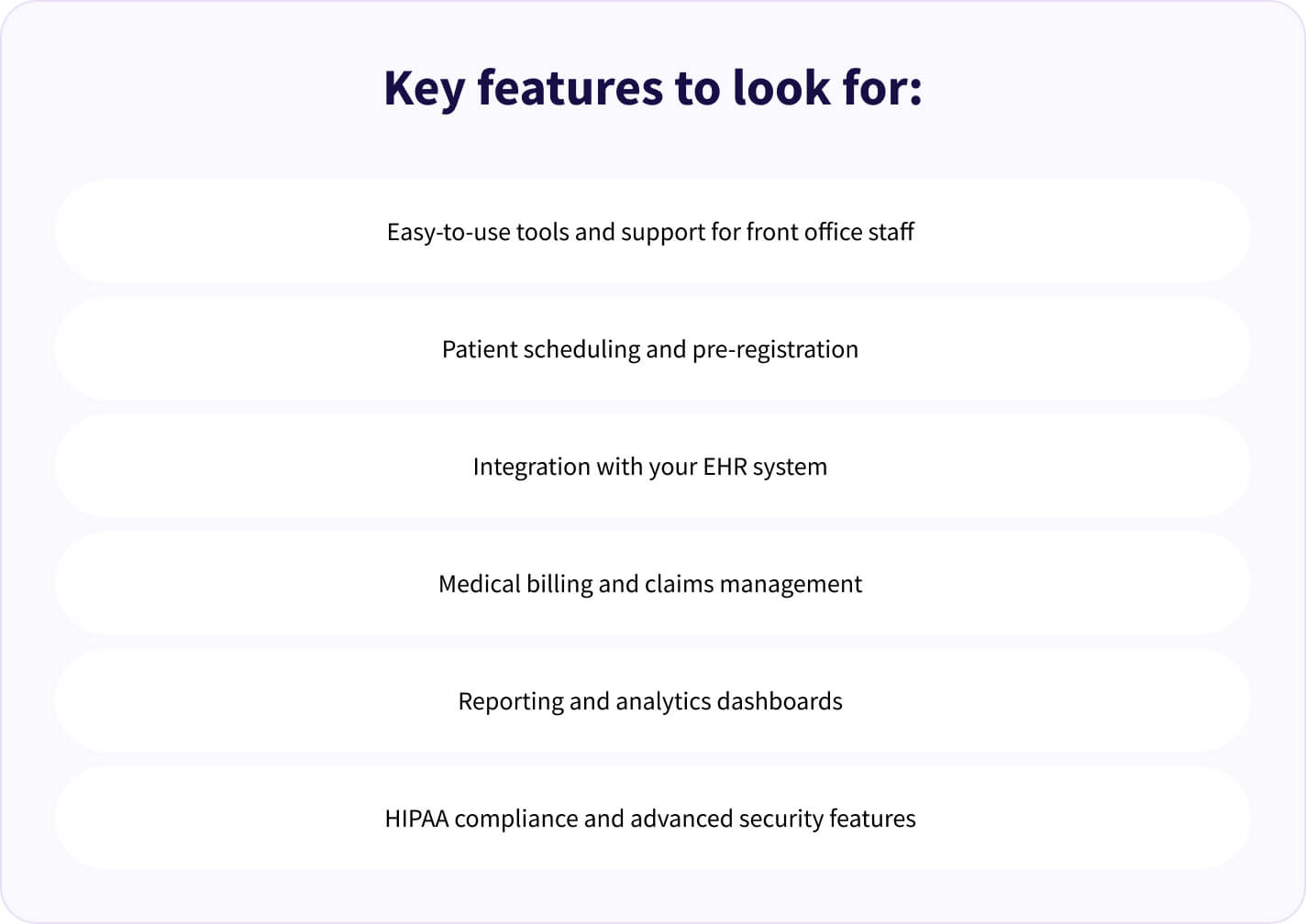Tips to help you find practice management software that streamlines clinical operations and gives valuable time back
Managing a medical practice can often feel like a balancing act of patient scheduling, billing codes and fee schedules, and compliance checklists. In fact, over 60% of physicians report feeling overwhelmed by these administrative tasks at least once a week, according to the 2025 Physician Sentiment Survey.1
As staffing shortages and financial pressures mount, many practices are looking to streamline operations, reduce the burden of administrative tasks, and focus more time on what matters most – patient care. Having the right practice management software (PMS) can be a game-changer day-to-day — while also laying the groundwork for long-term growth.
Here are some practical tips to help you determine what to look for in a practice management solution and choose the tool that’s right for your unique organization.
Let's take a look at how practice management systems have the power to give valuable time back to your team.
1) Assess your practice’s needs and growth goals
Before you evaluate options for practice management software vendors, take some time to assess your organization’s current workflows and long-term objectives.
Are you a small startup practice looking to establish basic operational infrastructure? Or an established healthcare organization that needs more advanced tools to manage patient volume and expand services? Start by answering these questions:
- What is the size and specialty of your practice?
- What are your current administrative pain points?
- How do you plan to grow or evolve your practice in the next few years?

While many practice management systems offer a standard set of features, not all offer the same level of usability, scalability, or support. Consider whether these basic practice management features will solve your needs, or if you need a vendor that provides hands-on support for clinical efficiency and/or billing, coding, and claims resolution.
2) Find a practice management solution that leverages AI and automation to save you and your staff time
Manual administrative tasks are among the top drivers of clinician burnout.2 Look for a practice management software platform that uses artificial intelligence (AI) and automation to eliminate repetitive work so your team can spend more time on high-value tasks. Automation for patient scheduling, insurance verification, medical billing, and more can save clinical staff valuable time.
Daily tasks like insurance eligibility, prior authorizations, claims submission, sending patient statements, and financial reporting can all be automated to ultimately add up to a more efficient and finely tuned revenue cycle process.
Many practice management systems include features like automated appointment reminders, which significantly reduce no-shows. Automated reminders via text, email, or through a patient portal helps patients remember their appointments.
Half of physicians say they’re considering major changes to practice operations in order to offset financial burdens. The right PMS can help.
3) Look for integrated PMS tools that scale with and support practice growth
Many practices struggle to get the information they need to accurately and proactively track financial performance. It can be a challenge to effectively manage revenue cycle and stay on top of patient payments, payer denials, and more.

Practices that have the right data at their disposal can better analyze and understand their overall financial health and tackle long-term financial challenges that may persist year over year. With practice management systems that include performance reporting and AI-powered analytics, you get a closer look at critical metrics, as well as view revenue trends over time.
4) Pick a solution that integrates seamlessly with your EHR
The most effective practice management systems are those that connect seamlessly with your electronic health record (EHR) and other tools in your tech stack. Integration reduces the need for duplicate data entry, minimizes errors, and improves overall staff productivity.
When PMS and EHR systems communicate in real-time, practices benefit from faster insurance eligibility checks, smoother handoffs between clinical and billing teams, more accurate medical coding and claims processing, and comprehensive patient and financial reporting.
5) Choose a practice management tool that prioritizes security
Cybersecurity isn’t optional for medical practices. Healthcare organizations are frequent targets for cyberattacks, and even a minor data breach can cause significant disruptions to care, patient trust, and compliance status. Many modern practice management systems are cloud-based, which can offer a host of benefits like advanced security and compliance, automatic updates, as well as real-time threat detection and data backup.4
Secure PMS tools often offer TFA or MFA (two-factor or multi-factor authentication) to add an extra layer of protection, and some are HITRUST certified, indicating a higher security standard for tech infrastructure.
Additionally, cloud-based systems can be more adaptable to practice growth. As your needs expand, you can scale resources up or down — without compromising security or adding new software complexity.
How athenahealth supports practice managers with the right solution
If you’re looking for a practice management system that combines AI-native automation, deep analytics, and enterprise-grade security, athenaOne® offers a unified platform that helps practices like yours thrive. Here are a few concrete examples of athenaOne’s practice management capabilities:
- AI-powered insurance selection: Integrated directly into athenaOne, AI-powered insurance selection works by processing a picture of the patient's insurance card through a machine learning model that analyzes the image, extracts information from the card, and pairs it with patient data to recommend the correct insurance. This feature significantly reduces manual insurance entry time, cutting related denials by nearly 13%5 and decreasing claim holds by 35%6, helping your practice operate more efficiently and get paid faster.
- Financial performance: Get a clear picture of financial performance and practical, actionable RCM advice using customizable Insights Dashboards. Using interactive charts, tables, and insights panels, your practice can take a data-driven approach to RCM and develop long-term strategies like creating practice management improvement plans, financial benchmarks, and revenue targets.
- Patient experience: From mobile apps to telehealth to online scheduling and reminders, athenaOne offers digital tools that are more convenient for patients and reduce workload for your front office staff.
- Interoperability: athenaOne is EHR-integrated and interoperable, including more than 277,000 pre-built direct connections to labs, hospitals, HIEs, pharmacies, imaging centers, registries, payers, and others across the healthcare ecosystem.7
- Cybersecurity: With real-time monitoring and rapid threat response protocols, athenahealth’s cloud-based infrastructure is designed to keep your practice secure. We continuously scan for vulnerabilities to help ensure minimal risk and business continuity.
Build a better foundation for practice operations and growth
The right practice management software isn’t just a tool — it’s a long-term partner in your practice’s success. By investing in a system that supports intelligent workflows, scalability, data-driven decisions, and security, you can reduce administrative burden, improve patient experiences, and create space for your team to focus on what matters most: delivering great care.
Whether you're starting fresh or looking to upgrade your current system, keeping these tips in mind will help you choose a practice management system — like AI-native athenaOne — that grows with you and supports your mission every step of the way.
Learn how athenaOne helped streamline care for a clinic with multiple locations.
More RCM resources
Continue exploring
1. 2025 Physician Sentiment Survey of 1,001 U.S. physicians fielded by Harris Poll on behalf of athenahealth.
2. 2025 Physician Sentiment Survey.
3. 2025 Physician Sentiment Survey.
4. NIH. (2018). Capabilities and Advantages of Cloud Computing in the Implementation of Electronic Health Record. https://pmc.ncbi.nlm.nih.gov/articles/PMC5869277/
5. Based on athenahealth data for 12 months ending June 2025; M236
6. Based on athenaOne data between July 2023 – June 2025; M242
7. Based on athenahealth data as of Dec. 2024; M020
Note: some content was updated in October 2025 for accuracy and relevance.









